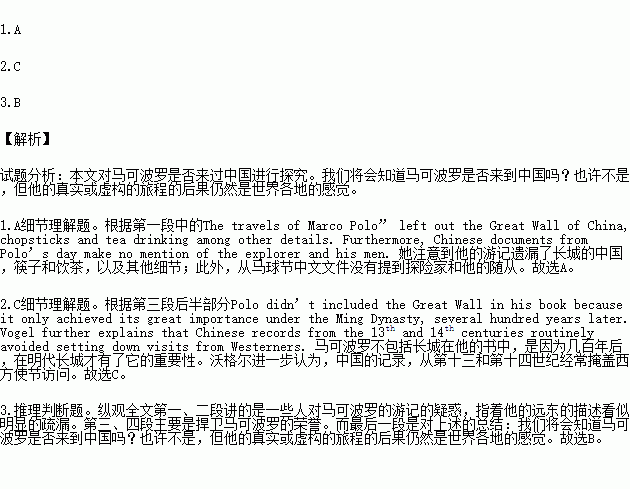题目内容
As early as the mid-18th century, some people began raising doubts about Marco Polo’s travels. They pointed to seemingly obvious omissions in his descriptions of the Far East. In 1995,historian Frances Wood argued in her book “Did Marco Polo Go to China?” that the famous explorer from Venice never made it pass the Black Sea. She noted that his travel journal “ The travels of Marco Polo” left out the Great Wall of China, chopsticks and tea drinking among other details. Furthermore, Chinese documents from Polo’s day make no mention of the explorer and his men.
Wood and other scholars have argued that Marco Polo based his tales of China on information collected from fellow trades who had actually been there. Last year, a team of Italian researchers became the latest skeptics to challenge Polo’s accounts. They said that archaeological evidence didn’t support his description of Kublai Khan’s Japanese invasions.
Now, however, research by Hans Ulrich Vogel of Germany’s Tubingen University might help prove Marco Polo was true. In a new book “ Marco Polo Was in China”, the professor of Chinese history counters the arguments most frequently made by skeptics. He tries to prove that Marco Polo spoke the truth. He suggests, for example, that Polo didn’t included the Great Wall in his book because it only achieved its great importance under the Ming Dynasty, several hundred years later. Vogel further explains that Chinese records from the 13th and 14th centuries routinely avoided setting down visits from Westerners.
Historians before him have touched on these issues while defending Marco Polo’s honor. But Vogel also relies on another evidence: the explorer’s very detailed descriptions of currency and salt production in the Yuan Dynasty. According to Vogel, Polo documented these aspects of Mongol Chinese culture in greater detail than any other of his time. This is a hint that the Venetian relied on his own powers of observation.
Will we ever know whether Marco Polo traveled to China? Perhaps not, but the consequences of his real of fictional journey are still felt across the globe. One reader of “The travels of Marco Polo” was Christopher Columbus, who stepped upon the New World while following in his Venetian idol’s footsteps.
1.France Wood doubted Marco Polo’s travel’s to China because his description__________.
A. missed some important culture of China.
B. covered so much about trader’s life.
C. was full of obvious mistakes.
D. seemed less detailed.
2.Vogel’s trust on Marco Polo is based on _______.
a. the Great Wall didn’t gain its importance then
b. records in Yuan Dynasty mentioned Polo
c. Polo’s mention of the currency and salt.
d. Polo’s other works are believable
e. Polo recorded what he saw in great detail
A. a, b, d B. a, c, d C. a, e D. b, c
3.Which of the following shows the structure of the text?



 ),并在其下面写出该加的词。
),并在其下面写出该加的词。 )划掉。
)划掉。